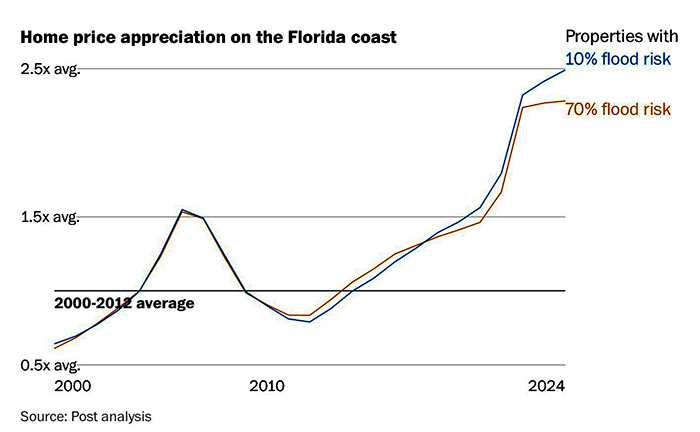

For some people, climate change is a vague abstraction about something that might happen in 100 years, or maybe not. Who knows? For the people in Florida who have just experienced two nasty hurricanes in a row, it is not a future abstraction. It is here right now. And it is affecting them in ways that they hadn't expected. In particular, the invisible hand of the free market has driven down the value of houses located in areas subject to flooding, while also driving up premiums for storm insurance. It is a double whammy for an increasing number of people.
Cape Coral, FL, west of Fort Myers, is ground zero for this problem. It has canals throughout the city, which makes flooding during storms much more likely than cities not connected to the ocean by water. And as sea levels rise, homes in Cape Coral may acquire swimming pools on their front lawns, for free. But it is not the only place. A study of millions of real estate transactions in Florida has shown that house prices in areas of substantial risk are not growing as quickly as places with less risk. In other words, climate change is actually costing people real money right now. Here is a key graph from the study:

Another problem for people in high-risk areas is that property insurance premiums have soared, especially along the Florida coast. Debbie Mucarsel-Powell is using this as a major theme in her Senate campaign, blaming the rise on Rick Scott when he was governor. Some insurance companies have withdrawn from the Florida market altogether. For a potential house buyer, the very real possibility of massive home damage due to a hurricane and the sky-high prices for insurance is at least a tool for arguing the selling price way down.
As it begins to sink in that climate change is real and is making their houses worth less, it is certainly possible that homeowners in Florida and elsewhere in areas subject to hurricanes, flooding, wildfires, and other natural disasters will demand that politicians do something about climate change since they have actual skin in the game. How long this process will take we don't know, but as more and more people see that they are personally being affected and their most expensive asset is declining in value, they may start to get the message. It could especially affect people whose only real asset is their house and their retirement plans consist of selling the house, renting an apartment, and living off the profit from the sale. If the decline in the value of the house becomes serious, it could upset their plans and they might start to demand action. (V)